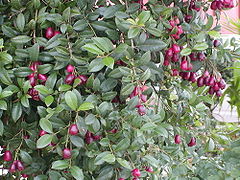Syzygium paniculatum: Difference between revisions
Jump to navigation
Jump to search
Created page with '{{SPlantbox |familia=Myrtaceae |genus=Syzygium |species=paniculatum |common_name=Australian brush cherry, Magenta brush cherry |name_ref=Flora - A Gardener's Encyclopedia |habi…' |
No edit summary |
||
| Line 1: | Line 1: | ||
{{SPlantbox | {{SPlantbox | ||
|familia=Myrtaceae | |familia=Myrtaceae | ||
|genus=Syzygium | |genus=Syzygium | ||
|species=paniculatum | |species=paniculatum | ||
|common_name=Australian brush cherry, Magenta brush cherry | |common_name=Australian brush cherry, Magenta brush cherry | ||
|name_ref=Flora - A Gardener's Encyclopedia | |name_ref=Flora - A Gardener's Encyclopedia | ||
| Line 25: | Line 25: | ||
|usda_ref=Flora - A Gardener's Encyclopedia | |usda_ref=Flora - A Gardener's Encyclopedia | ||
|max_zone=12 | |max_zone=12 | ||
|image= | |image=Eugenia myrtifolia.jpg | ||
|image_width=240 | |image_width=240 | ||
}} | }} | ||
The '''magenta lilly pilly''' (''Syzygium paniculatum'', [[synonymy|syn.]] ''Eugenia paniculata''), also known by the common name '''magenta cherry''', is a broad dense bushy [[rainforest]] [[tree]] native to [[New South Wales]]. It grows to a height of 15 m with trunk diameter up to 35 cm. Leaves are 3-9 cm long, opposite, simple and slightly obovate, tapering at the leaf base. The leaves are dark glossy above, and paler below. White flowers are produced in clusters. The edible fruit is usually magenta, but can be white, pink or purple.<ref> Floyd, A.G., ''Rainforest Trees of Mainland South-eastern Australia'', Inkata Press 1989, ISBN 0-909605-57-2</ref> | |||
It is commonly cultivated in eastern Australia and elsewhere. Well known as an edible wild fruit with a pleasantly sour apple like flavour. It is eaten fresh or cooked into [[jams]]. | |||
It is commonly confused with ''[[Syzygium australe]]'', brush cherry. | |||
==Cultivation== | ==Cultivation== | ||
| Line 44: | Line 48: | ||
==Gallery== | ==Gallery== | ||
<gallery perrow=5> | <gallery perrow=5> | ||
File:Syzygium paniculatum 03 Pengo.jpg| photo 1 | |||
File:Syzygium paniculatum 88 cm trunk diameter.JPG| photo 2 | |||
Image:Upload.png| photo 3 | Image:Upload.png| photo 3 | ||
</gallery> | </gallery> | ||
Latest revision as of 17:00, 23 June 2010
| Syzygium paniculatum subsp. var. | Australian brush cherry, Magenta brush cherry | |||||||||||||||||||||||||||||||||||||||||||||||||||||||
|---|---|---|---|---|---|---|---|---|---|---|---|---|---|---|---|---|---|---|---|---|---|---|---|---|---|---|---|---|---|---|---|---|---|---|---|---|---|---|---|---|---|---|---|---|---|---|---|---|---|---|---|---|---|---|---|---|

|
|
| ||||||||||||||||||||||||||||||||||||||||||||||||||||||
| ||||||||||||||||||||||||||||||||||||||||||||||||||||||||
The magenta lilly pilly (Syzygium paniculatum, syn. Eugenia paniculata), also known by the common name magenta cherry, is a broad dense bushy rainforest tree native to New South Wales. It grows to a height of 15 m with trunk diameter up to 35 cm. Leaves are 3-9 cm long, opposite, simple and slightly obovate, tapering at the leaf base. The leaves are dark glossy above, and paler below. White flowers are produced in clusters. The edible fruit is usually magenta, but can be white, pink or purple.[1]
It is commonly cultivated in eastern Australia and elsewhere. Well known as an edible wild fruit with a pleasantly sour apple like flavour. It is eaten fresh or cooked into jams.
It is commonly confused with Syzygium australe, brush cherry.
Cultivation
Propagation
Pests and diseases
Varieties
Gallery
-
photo 1
-
photo 2
-
photo 3
References
- ↑ Floyd, A.G., Rainforest Trees of Mainland South-eastern Australia, Inkata Press 1989, ISBN 0-909605-57-2
External links
- w:Syzygium paniculatum. Some of the material on this page may be from Wikipedia, under the Creative Commons license.
- Syzygium paniculatum QR Code (Size 50, 100, 200, 500)


